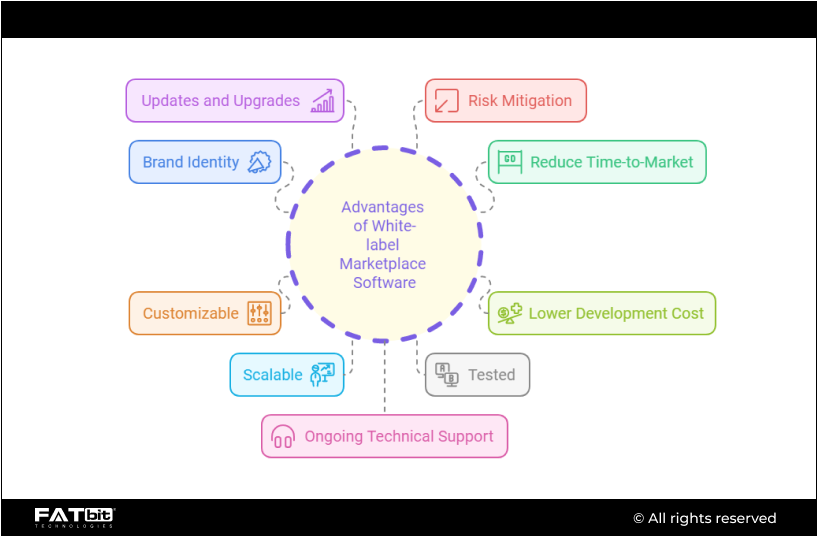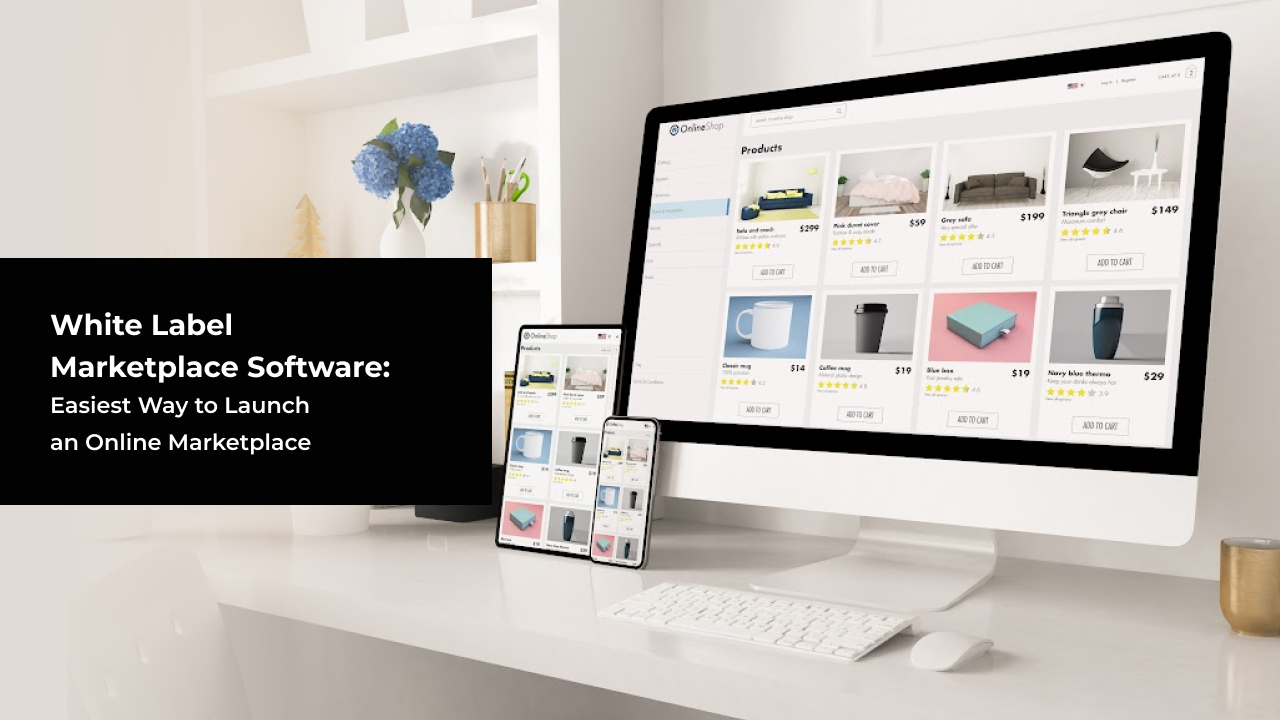White Label Marketplace Software: Easiest Way to Launch an Online Marketplace in 2025
Published on 29th October 2024
Whenever we talk about marketplaces, it’s natural to recall the names, Amazon, eBay, Walmart, Alibaba, and can be more. They have revolutionized the path of the online retail market and maintained the legacy over time. However, several factors fuel the eCommerce industry’s growth, including product variety, competitive pricing, smartphone adoption rates, enhanced customer experience, attractive offers, etc.
According to Statista, The global e-commerce market is projected to reach 4.4 trillion in 2024 and $6.4 trillion by 2029. These statistics show the industry is booming, especially in the upcoming years. Entrepreneurs can easily tap into this growing industry and capitalize on the opportunity to build a successful business by launching their online marketplace. This blog will guide you through the easiest way to launch a white-label online marketplace.
Before you dive deep into the blog, see the statistics demonstrating the growing demand for online marketplaces and the potential for new entrants:
| Statistic | Value |
| The revenue of the eCommerce is projected to reach in 2029 | $6.4 trillion |
| The revenue is expected to grow with an annual growth rate (CAGR 2024-2029) | 9.49% |
| The number of users is expected by 2029 | 3.6 Billion |
| User penetration is expected to hit by 2029. | 49.1% |
Credits: Statista
Table Of Contents
- What is White-label Marketplace Software?
- What are the Advantages of White-label Marketplace Software?
- Who Needs White-label Marketplace Solutions?
- How to Choose the Right White Label Marketplace Software for Your Business?
- 4 Steps to Launch an Online Marketplace Using White-label Software
- Reasons to Choose Yo!Kart for Your White-label Marketplace Software
- Key Highlights of Yo!Kart: A Readymade White-label Marketplace Solution
- Last Thought
- FAQ’s
What is White-label Marketplace Software?
A white-label marketplace software is a readymade marketplace solution that allows entrepreneur or businesses to launch their own white-label marketplace. Entrepreneurs hold the license and ownership of the software and can customize the platform tailored to their business requirements. Marketplace owner can change the theme, color, logo, and overall design as per their preferences or even customize features and functionalities from the back-end. In short, white-label marketplace owner get complete control to manage and grow their platform. This readymade marketplace solution empowers entrepreneurs or enterprises to expand their business online.
What are the Advantages of White-label Marketplace Software?
White-label marketplace software is not just limited to software, it has a lot of advantages for entrepreneurs who want to launch a marketplace quickly to respond to customers and capitalize on the market with the trends. Let’s discuss some advantages of white-label marketplace software below:

- Branding: It is one of the most significant advantages of white-label marketplace software. It offers the opportunity to personalize and brand the marketplace aligning with the company’s brand identity. Businesses can change the name, logo, theme, and add other branding elements to market the platform under their brand names.
- Reduce Time-to-Market: It allows entrepreneurs to launch their online marketplace in less time without compromising on features and functionalities. As a white-label marketplace solution comes with all essential features right out of the box and doesn’t require development from scratch, it allows owners to launch a fully operational marketplace within a month or earlier.
- Lower Development Costs: Building an online marketplace from scratch can cost between $50,000 to $100,000 or even more. Hence, businesses can opt for the white-label online market at a lower expense. In addition, finding an experienced and right development team for custom development is also a challenge.
- Customizable: White-label marketplace software is typically a pre-built solution that offers a range of customization options. Marketplace owners get access to add, remove and modify features, functionalities, and any other marketplace-related updates catering to the specific business requirements.
- Scalable: While expanding the marketplace, businesses aren’t required to spend additional money for the redevelopment of the software. The white-label marketplaces are scalable and can easily expand with the growing business.
- Risk Mitigation: A white-label marketplace software is built utilizing tested technology that is already used and tested by diverse clientele which reduces the risk of bugs, security vulnerabilities, and any other technical failures. White-labeled solutions are cost-effective solutions compared to building a marketplace from scratch, so they also lower the risk of financial losses.
- Updates and Upgrades: Such a white-label software provider handles software updates and upgrades. They provide time-to-time updates in order to add new features, improve functionalities, and enhance performance while managing existing bugs and errors.
- Ongoing Technical Support: When you choose white-label marketplace software, you get access to technical support from the software provider. They help you resolve the technical bugs and errors associated with the software. This support can save you time and effort and allow you to focus on growing your marketplace.
Who Needs White-label Marketplace Solutions?
White-label solutions can be an ideal solution for entrepreneurs, retailers, manufacturers, service providers, and any other small to large businesses who want to launch an online marketplace. Building an online marketplace allows marketplace owners to reach out to a wide customer base with their online presence. Their online marketplaces can be categorized by types of trade, such as B2B (business-to-consumer), B2B (business-to-business), C2C (consumer-to-consumer), P2P (peer-to-peer), or any other as per their business idea.
To Explore Our White-label Marketplace Solution
How to Choose the Right White Label Marketplace Software for Your Business?
The selection of the right white-label marketplace solution ensures a strong foundation for your business. The white-label solution is a fast and cost-effective way to launch your marketplace platform. It can reduce the time to market, improve user experience, and allow you to access the latest technology with its cutting-edge solution. Explore how to choose the right marketplace software in detail below:
- Define Your Requirements:
Before you launch your marketplace, it is recommended to research and define your target audience. It helps you choose the products or services you want to offer on the platform. Furthermore, it also allows you to plan your marketing strategies for marketplace growth.
- Explore Customization Options:
After doing proper market research, don’t forget to discuss the customization option on the platform. Examine the re-branding solution including logo positioning, themes, user interface, and any changing the look and feel of the platform aligning with your brand identity. Also, check the customization options for the features and functionalities to meet the changing requirements of your platform.
- Assess Scalability:
Scalability is one of the crucial characteristics of an online marketplace. It refers to the ability of the white-label marketplace platform to support growth by handling more users, transactions, and listings without compromising performance. Therefore, ensure with the software provider whether the solution is scalable or not. A scalable marketplace solution allows businesses to expand their marketplace without incurring significant costs.
- Type of White-label Software (SAAS or Licensed based)
The next step is to decide whether you prefer a Software as a Service (SAAS) model or a licensed-based solution (self-hosted solution) based on your business needs. Let’s explore the difference between SaaS and self-hosted marketplace software:
| Licensed Software (Self-Hosted Software) | Software as a Service (SaaS) |
| The owner hosts and maintains the software | It is hosted and maintained by the solution provider |
| It is hosted and maintained by the solution provider | Subscription-based software solution |
| One-time payment for software license | Requires recurring charges based on services |
| Offers complete control over the software | Unlocks services based on the subscription plan |
| Data is stored on the marketplace owner’s server | SaaS data is stored remotely on their server |
| Can be customized as per the business requirements | It doesn’t allow customization tailored to your requirements |
| Cost-effective in the long run | Ongoing subscription or recurring fees |
| Unlimited users, listings, transactions, admin profiles, etc | Limits users, listings, transactions, and admin profile |
| Provide extensive pre-built customization options | It requires coding for additional features |
| Highly scalable and accommodates all stages of business growth | Cost increases and additional charges applicable on scaling |
- Consideraion of APIs Integration:
Consider whether the platform allows custom API integrations or not while choosing white-label marketplace software. APIs are the essential components of the marketplace to accommodate a growing user base and evolving business requirements. They can be integrated with the platform with minimal coding if the platform’s code allows.
- Compare Pricing
However, the consideration of pricing is always crucial, but it shouldn’t be the sole determinant. Pricing can vary because various development companies might offer varying pricing models, such as subscription-based, fixed pricing, license-based, or other. Always compare these pricing models against marketplace requirements. Again don’t go with the lower cost, the balance between the cost and quality is always required for the best results.
4 Steps to Launch an Online Marketplace Using White-label Software
You can launch your white-label marketplace in just four easy steps. Let’s explore the steps to launch a white-label marketplace easily and reliably:
Step 1: Select the Right White-Label Marketplace Solution:
Choose the white-label marketplace solution that caters to your specific niche and has a proven track record. In this selection process, you can check ratings and reviews, evaluate features, compare scalability, and request the demo for a better understanding of the entire marketplace process.
Step 2: Configure Marketplace:
After selecting your white-label solution, the next step is to align your marketplace to reflect your brand identity. This process includes logo customization, theme application, UX/UI enhancement, mobile optimization, and the addition of required features to enhance the overall shopping experience.
Step 3: Onboarding Vendors/Sellers
Develop a streamlined onboarding and product listing process for vendors. This could include a simple registration form to register on the platform, a marketplace tutorial to understand how the platform will operate, vendor guidelines to outline the rules and expectations for product quality, pricing strategies, and customer service standards. In addition, establish a support system for vendors to address their queries and issues promptly.
Step 4: Launch Your Marketplace
The final and fourth step is to launch your marketplace but before the official launch, conduct extensive testing to identify and fix any bugs and errors. Also, test all features and functionalities, including payment processing, vendor management, and order process, and then launch your marketplace.
Reasons to Choose Yo!Kart for Your White-label Marketplace Software
Yo!Kart is a ready-made white-label marketplace software that allows entrepreneurs to customize and rebrand the solution under their brand name. It’s a fully customizable and scalable marketplace solution that can align with the branding and accommodate all stages of business growth. Yo!Kart empowers businesses with faster Time-to-Market and leads the industry with extensively optimized eCommerce solutions.
Yo!Kart has empowered 5000+ businesses globally. It is typically built on robust scalable technology to ensure a seamless user experience and operations. Yo!Kart offers lifetime ownership with a one-time payment. It also offers flexible payment options to entrepreneurs in order to help them establish their startups. Let’s explore a few key features of Yo!Kart below:
Key Highlights of Yo!Kart: A Readymade White-label Marketplace Solution
- Cutting-edge technology: Yo!Kart is built with cutting-edge technology that helps businesses stay ahead of their competitors. It allows them to streamline their processes, automate tasks, increase productivity, and personalize customer experience by minimizing bugs and errors.
- Branding Opportunity: It offers rebranding opportunities allowing you to gain brand recognition and earn customer loyalty by aligning the marketplace with your brand identity. Marketplace owners can easily customize Yo!Kart as per their preferences and brand guidelines.
- Customizable and Scalable: Yo!Kart is fully customizable and scalable white-label marketplace software that allows you to personalize and grow your marketplace without any hassle.
- Enhanced User Experience: The intuitive design of Yo!Kart is visually appealing and user-friendly for all user types including Admin, Vendor/Seller, and Buyer. They can easily interact, navigate, control, manage, and utilize marketplace features and functionalities enabling a satisfied user experience.
- Business Models: Yo!Kart supports different business models, such as B2B, B2C, and C2C/P2P. This includes features such as customizable workflows, payment gateways, and shipping integrations. With Yo!Kart’s different business model features, businesses can adapt to the changing market conditions and expand their customer base easily.
- SEO and Marketing: The SEO and marketing features of Yo!Kart helps businesses improve their online visibility and attract more customers allowing them to drive more traffic and boost sales. This includes features such as search engine optimization, social sharing, and other promotional marketing automation.
- Analytics and Reporting: Yo!Kart allows detailed reporting and analytics to track sales and monitor performance by allowing the marketplace to plan a strategy and make data-centric decisions to stay ahead and competitive in the market.
- Upgrades and Updates: Yo!Kart ensures the platform stays up-to-date with the latest technology and trends. This includes features such as regular software updates, security patches, and new feature releases. With Yo!Kart’s time-to-time upgrades and updates, businesses can stay ahead of the competition, improve their online marketplace, and enhance overall customer experience.
Launch Your White-label Marketplace with Yo!Kart
Last Thought
Launching your marketplace with a white-label marketplace solution is cost-effective and reliable compared to developing a marketplace from scratch. White-label marketplace software is a readymade solution that allows you to launch your marketplace quickly and readily. It comes with all pre-defined essential features and functionalities that allow marketplace owners to operate and grow the marketplace. Yo!Kart is a white-label marketplace solution that allows you to launch your marketplace effortlessly.
FAQ’s
Q 1. What is white-label marketplace software?
Ans: White Label Marketplace Software refers to pre-built marketplace platforms that can be customized for businesses to quickly launch their own online marketplaces. This turnkey solution offers an easy way for businesses and entrepreneurs to enter the e-commerce marketplace space without developing everything from scratch. It allows entrepreneurs to rebrand the platform by changing the platform’s name, logo, color, theme, and other associated brand-related details on the software.
Q 2. How to launch a multi-vendor marketplace with white-label marketplace software?
Ans: To launch a multi-vendor marketplace, the first and foremost step is to choose the right white-label marketplace solution that aligns with your niche. The next step is to customize the software as per your brand identity and decide revenue model. After customization and deciding revenue model, it’s time to invite vendors to list their products on your marketplace, run promotional campaigns, and then go live. Though, don’t forget to check bugs and errors on the platform before you go live.
Q 3. Is White-Label Marketplace Software Scalable?
Ans: Yes, white-label marketplace software is scalable. Most of the white-label marketplace solutions are designed to scale with your growing business. Yo!Kart is a fully scalable white-label marketplace solution that can handle an increasing number of users, products, vendors, users, transactions, and much more.
Q 4. Why choose white-label marketplace software over building a marketplace from scratch?
Ans: White-label marketplace software helps you save your time, money, and resources. It is a ready-to-use solution that allows businesses to launch their marketplace with minimum customization. In contrast, building a marketplace from scratch can take eight months to a year but with with white-label solution, you can launch your marketplace within one month or earlier. In addition to this, the white-label solution comes with all the essential features and functionalities and is time-tested.
Q 5. Does white-label marketplace software allow third-party API integration?
Ans: Most of the white-label solution supports third-party API integrations for additional features and functionalities including payment gateway integration, shipping management, order management, analytics and reporting, and so on. Yo!Kart comes with all the essential pre-integrated APIs and allows users to integrate APIs as per their preferences and business requirements.
Q 6. What are the key features of white-label multi-vendor marketplace software?
Ans: If you want to stay ahead in this competitive eCommerce landscape then your marketplace needs to have all the essential features and functionalities. White label marketplaces have many key features, including scalability, brand customization, API integration, payment processing, shipping management, analytics and reporting, email marketing, social media marketing, SEO features, multi-lingual and multi-currency support and more.





